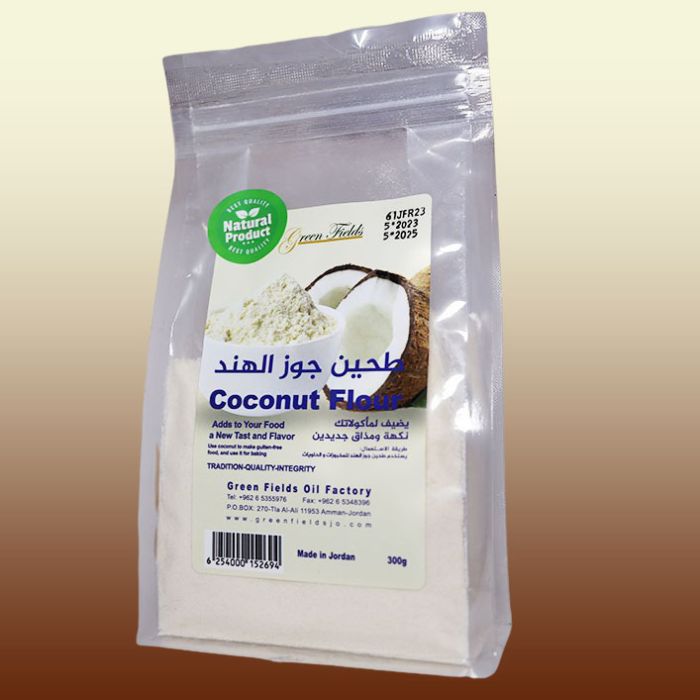
- without additives
- laboratory tested
- Ships within 24 hours worldwide
- *Request a bulk quote email info@greenfieldsjo.com
- Whatsapp: 00962777425666

Coconut Flour Defatted
Defatted Coconut Flour
Product Name
Common Names:
Coconut Flour, Coconut Powder, Defatted Coconut Flour, Dried Coconut Flour, Coconut Meat Flour
Latin Name:
Cocos nucifera L.
INCI Name:
Cocos Nucifera (Coconut) Fruit Powder
Type
Food Ingredients
Extraction Method
Our defatted coconut flour is made by cold pressing premium coconut oil, using no heat or solvents at any stage.
This careful method leaves behind a clean, dry flour that retains its natural fiber and nutrients.
Purity & Quality
Our food products are of premium quality, suitable for both food-grade consumption and cosmetic use.
Visit our Green Fields Oils Factory for more information on our commitment to quality and sustainability.
Our factory is ISO 22000 certified, ensuring food safety management, and we also adhere to the highest standards to guarantee every batch is of the best quality.
Volume & Size
- 300g: Comes in a food-grade licensed plastic pouch, ensuring the highest safety standards for food products.
- 500g: Comes in a food-grade licensed plastic pouch, ensuring the highest safety standards for food products.
Packaging Notes
The plastic bottles are food-grade licensed, ensuring no harmful chemicals leach into the product.
This type of packaging are designed for safety & quality.
Usage Instructions:
- Mix with regular flour (10–25%) in baking for added fiber and mild coconut flavor.
- Use alone in gluten-free recipes, but increase binding agents (like eggs, guar gum, or psyllium).
- Blend into pancake or waffle batter for a healthier twist.
- Use in energy bars or protein balls for texture and nutrition.
- Stir into yogurt or oatmeal for added thickness and nutrients.
Shelf Life & Storage:
Store your flour in a cool, dark place, away from direct light or heat.
Avoid exposure to sunlight or any source of light.
You can also store it in the fridge for extended freshness, although not necessary.
Shelf life: 2 years from the date of production.
Certifications
- Our factory is ISO 22000 certified, meaning we adhere to global food safety standards. This means we prioritize safety in every step of the production process, from sourcing to bottling.
- Our factory is USA FDA certified, meaning they meet the high standards set by the U.S.
| SKU | 653 |
|---|---|
| Weight | 0.335000 |
| Brand | Green Fields |
The Deceptive Practices in Coconut Flour Production and the Superiority of Cold-Pressing Residues
Coconut flour, a byproduct of coconut milk and oil production, has gained popularity due to its health benefits and culinary versatility. However, the industry's production methods are not always transparent or ethical. This essay explores common deceptive practices in coconut flour production and contrasts them with the more sustainable and genuine method employed by Us.
Common Industry Practices
-
Quality Compromise in Raw Material Selection: Many producers use inferior quality coconuts, which may be overripe or improperly stored, leading to compromised nutritional value and taste in the resulting flour.
-
Chemical Processing and Additives: Some manufacturers use chemical processes to extract maximum oil, leaving the coconut residue depleted of its natural oils and nutrients. Additionally, artificial preservatives, colorants, and flavor enhancers are often added to enhance the appeal of lower-quality flour.
-
Misleading Labeling: Labels may claim "all-natural" or "pure" coconut flour while hiding the use of additives or the involvement of chemical processes.
-
Environmental Impact: Conventional production methods often overlook environmental sustainability, resulting in higher carbon footprints and waste.
The Science of Coconut Flour Production
Coconut flour is derived from the coconut meat after the milk and oil have been extracted. The process involves drying and finely grinding the coconut meat. However, the methods of drying (sun-drying vs. artificial heating) and the degree of oil extraction can significantly alter the flour's quality.
Green Fields Oils: Our Sustainable Alternative
We adopt a unique approach:
-
Utilizing Cold-Pressed Oil Process: The solids resulting from cold-pressing coconut oil are used to make coconut flour. This method retains more natural nutrients and flavors, as cold-pressing is a more gentle extraction method compared to heat and chemical-based processes.
-
No Additives or Chemicals: We ensures that no artificial additives are used, maintaining the flour's purity and nutritional quality.
-
Eco-Friendly and Sustainable Practices: Prioritizing sustainability, our method minimizes waste and environmental impact, aligning with their ethos of eco-responsibility.
Coconut Flour: A Tale of Tropical Beginnings and Culinary Adventure
Imagine a coconut rolling into a history class, ready to share its story. It might sound a bit funny, but the history of coconut flour is as rich and intriguing as the flavor it brings to our dishes. Let’s embark on this tropical tale, from its humble beginnings on sunny shores to its place in kitchens around the world.
The Early Days in Tropical Paradises
Coconut flour started its journey on the beautiful, sun-kissed islands of the tropics. Here, coconuts weren’t just another fruit; they were a crucial part of life. Islanders discovered that when they dried the coconut meat and ground it up, it turned into a fine, powdery flour. This wasn’t just a new ingredient; it was a culinary revelation.
A Flour That Traveled the World
As sailors and traders from Europe and Asia began to explore these tropical islands, they found many wonders, including the versatile coconut. They brought coconuts back home, and soon, coconut flour started to make its mark in distant lands. It was a taste of the tropics, a souvenir from far-off islands that found its way into foreign cuisines.
Coconut Flour in the Modern Kitchen
Fast forward to today, and coconut flour has become a favorite, especially among people looking for healthier, gluten-free options. It fits perfectly in today’s health-conscious world with its low-carb and high-fiber content. But it's not just healthy; it’s also delicious, adding a subtle, sweet flavor to baked goods that everyone loves.
Our Special Touch on Coconut Flour
In this long history of coconut flour, our product stands out. We make our coconut flour with care, keeping it as natural and pure as it was in those ancient island times. We use traditional methods, making sure every bit of the flour holds the natural goodness of coconuts. Our coconut flour is a tribute to its tropical roots and a gift to modern kitchens.



